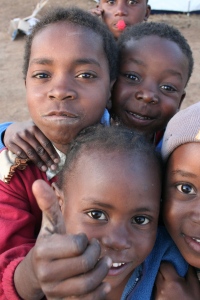And now outside, the stir and movement of people, but behind them, through them, one could hear the roar of a great city. Johannesburg. Johannesburg.
Who could believe it?
– Alan Paton, “Cry, the Beloved Country”
I know there are few things more trite than to start writing with an epigraph, but as I was thinking about how to sum up our Johannesburg trip, I found so many relevant quotes, and so many similarities to our trip, in Paton’s 1948 odyssey. Written by a white teacher and activist who had not yet seen institutionalized apartheid, who never saw Nelson Mandela freed from prison, or elected president, who never saw the outbreak of xenophobic attacks, “Cry, the Beloved Country” chronicles the journey of Stephen Kumalo, a pastor, as he heads into the strange, wild city of Johannesburg looking for his son. I won’t spoil anything in case anyone reads it later, but put simply, Kumalo comes to the city, finds some success and some failure in his journey, and he returns home, changed.
Along the way, though, he encounters the divergent worlds and segments of society that make up the city. In townships, churches and offices, he meets good people and bad people of all races and genders. He meets great justice and great injustice and, as Paton writes, “justice, even if it is not just.” In some ways he finds what he’s searching for, in other ways he doesn’t, but mostly he finds people and lessons he didn’t know he was looking for.
And in so many ways, in Kumalo’s story, I see all of ours. Though we were looking for stories and not our children, we too were thrown into a city we didn’t really understand — a city I don’t think we really understand, still — and navigated back streets and hidden cities and taciturn officials to encounter pain and joy and confusion and resiliency. We found a million things we were trying to find and a million things that found us, maybe because of, or maybe despite, our best efforts. And we also left, changed.
How exactly we changed, as my fellow bloggers have already eloquently stated, is unclear. But I think what will stick with me the longest about this experience are these barriers and contradictions I found. I’ll cherish the people I met and the friends I made and even the difficulties I went through, but through it all, what fascinates me, are these divisions in society: the separations of nationalities, of races, of languages, of incomes, of ages, of tribes, of totems, of genders, of sexualities, of political parties.
As I’ve continually harped on to the other students I traveled with (much to their chagrin, I’m sure) is how, when given the task of going to South Africa to report on border issues, I started out only thinking about literal borders, with Zimbabwe, and Mozambique, and Botswana, Namibia, Lesotho and Swaziland. But having gone there, I see that South Africa’s border issues are much deeper, more numerous and nuanced, and more compelling than that. So much of the country’s history, much like our country’s history and probably all countries’ histories, has been dictated by these barriers. And in these bending and merging borders — where man meets woman and heterosexual meets homosexual and Shona meets Ndebele and white meets black and ZANU-PF meets MDC and Malawian meets South African — lie the greatest struggles and the most potential for pain and bloodshed, but ultimately the most interesting and important stories to tell.
My nine amazing fellow Arizona journalists and I, as well as our companions from Wits and Nebraska, we heard the stir and the movement of Johannesburg’s people (plus a pterodactyl or two), we saw these lives and these stories between the lines. And though we may not have found all we were looking for in our briefest of trips to Johannesburg, behind it all, through it all, I think we found something greater.





